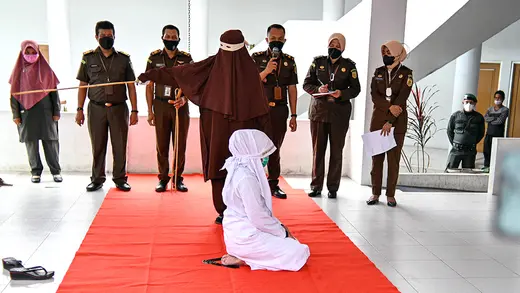In Brief
Iran Isn’t the Only Country With Morality Police
Multiple countries have special police that enforce Islamic moral codes. Here’s how Iran’s morality police compare to other forces with the same goals.
Iran’s morality police have gained international notoriety, but they aren’t the world’s only Islamic religious police or the first ones accused of mistreating citizens. A handful of countries in Africa, the Middle East, and Southeast Asia have police devoted to busting so-called un-Islamic activities. Iran and Saudi Arabia, for example, dedicate thousands of officers to this purpose. In some other countries, general police units enforce Islamic moral codes as well as secular laws.
Such countries have criminalized behaviors including drinking alcohol, social mixing of unrelated men and women, sex outside of marriage, sex between people of the same gender, skipping prayers, and wearing types of dress deemed immodest. Those charged with violations regularly face fines and imprisonment, as well as traditional sharia-based sentences such as caning and—in some countries—death by stoning. However, the latter is rarely carried out, and death penalties are more regularly conducted by other methods.
Islamic morality police trace their roots to seventh-century market inspectors. Tasked with preventing fraud, inspectors’ duties expanded under the broad Quranic mandate of “commanding the right and forbidding the wrong.”
More on:
Morality police have supporters among some Muslims who say they deter indecent behavior and preserve Islamic culture and principles. Detractors point out that the forces tend to mostly employ men and disproportionately target women and minorities. Citizens in many of these countries also complain of heavy-handed and uneven enforcement of laws. Western governments and international rights organizations have likewise decried abuses and discrimination by morality police, especially those in Afghanistan, Iran, and Saudi Arabia, all three of which regularly repress activism and dissent.
Here’s a look at morality police in several countries:
Iran
Formed in 2005, the Gasht-e Ershad (Guidance Patrol) ensures that all women wear headscarves and loose clothing in public. It inherited this duty from a committee formed after Iran’s 1979 revolution. Even non-Muslims must comply. There isn’t clear guidance for wearing headscarves, and women are often detained arbitrarily. Violators can be fined, lashed, and sent to reeducation centers. The Guidance Patrol has been widely condemned amid protests over the death of Mahsa Amini that started in September 2022; many Iranians say they believe she was beaten in the patrol’s custody. Its current status is unclear. Some officials say it was abolished in favor of other means of enforcement, but the ministry that oversees the force hasn’t commented, and there are reports of its continued activity in several cities.
Afghanistan
After regaining control of Afghanistan in 2021, the Taliban reestablished the Ministry for the Propagation of Virtue and the Prevention of Vice, whose officers enforce a draconian interpretation of Islamic law. Women must cover their faces and be accompanied by men when traveling more than forty-five miles (seventy-two kilometers). Individual officers crack down on playing music and wearing Western-style dress, though neither is formally forbidden. These restrictions recall the Taliban’s previous rule, when alleged violators suffered beatings, amputations, and public executions. Those punishments are on the rise again.
Indonesia
The Wilayatul Hisbah, commonly known as sharia police, only have jurisdiction over Muslims in semiautonomous Aceh Province, which imposed sharia-based law in 2001. Like in Iran, women must wear loose-fitting clothes and headscarves; however, dress violations can’t lead to detention. Other violations of Islamic law regularly result in imprisonment or public caning.
More on:
Nigeria
Started in 1999, the Hisbah Corps police Muslims in much of Nigeria’s north, being most active in Kano State. They have no presence in the predominantly Christian south and do not have the secular police’s power to arrest. They sometimes face opposition over how they interpret Islamic law. Their powers and resources vary by state [PDF], and not all of their functions are disciplinary; families can seek the Hisbah Corps’ services for dispute resolution, for example.
Saudi Arabia
Saudi Arabia launched the first modern Islamic morality police in 1926, amid the rise of Wahhabism, a puritanical form of Sunni Islam. For decades, the Mutawa harshly enforced gender segregation, dress codes, and prayer attendance. It drew reproach, including over its involvement in car chase fatalities and in the deaths of fifteen schoolgirls in 2002. (The force reportedly prevented their escape from a burning building due to their immodest dress.) Crown Prince Mohammed bin Salman started eroding its powers in 2016, a move unpopular among some conservatives but largely accepted by the public. Today, it reports infractions to the general police, and violations that once could be punished with flogging now result in fines.
 Online Store
Online Store

